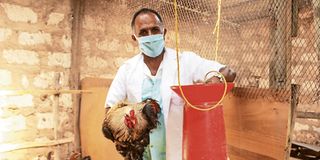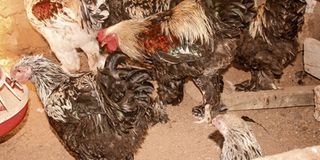Premium
King of fowls, Brahma, is my moneymaker

Poultry farmer, Abdulrahim Morodhi, with his Brahma chicken in his Mombasa farm. The chicken breed, developed in the US, is a crossbreed between American birds and large breeds imported from the Chinese port of Shanghai. PHOTO | MAUREEN ONGALA | NATION MEDIA GROUP
What you need to know:
- The chicken breed, developed in the US, is a crossbreed between American birds and large breeds imported from the Chinese port of Shanghai.
- The docile chickens are known for their big size that gives them the ability to cover all their eggs during brooding
- The farmer says he is currently focused on increasing his brood, despite receiving many orders for sale.
- Some of the diseases that affect the birds include Newcastle, fowl pox and fowl cholera.
Dressed in a white overcoat and black gumboots, Abdulrahim Morodhi, a poultry farmer, normally starts his day by visiting his chicken house to feed the birds and clean the feeding and watering troughs.
The retired accountant who lives in Mariakani, Mombasa, dedicates most of his time to the birds of the Brahma breed, which are kept for meat, eggs and ornamental purposes.
The chicken breed, developed in the US, is a crossbreed between American birds and large breeds imported from the Chinese port of Shanghai. They are large in size, thus are often referred to as “kings of chickens”.
The docile chickens are known for their big size that gives them the ability to cover all their eggs during brooding.
They lay medium to large-size brown eggs. “I started the business last year after getting my first birds from a friend who was keeping them but was asked to vacate his premises by the landlord. He gave me two and sold the rest. I now have 26 mature birds and 42 chicks,” says Morodhi.
The farmer says he is currently focused on increasing his brood, despite receiving many orders for sale.
He has built a 50-by-25 feet chicken house and has sub-divided it into eight units, with the housing costing him more than Sh100,000.
“I hatch the chicks in an incubator and then place them in a small brooder, before later moving them to the pens according to their ages,” he says, noting though he uses an incubators, the birds are good breeders.
Morodhi controls inbreeding by exchanging the cocks with a farmer friend. Besides the Brahma breeds, he also rears about 200 broilers.
FAIR SHARE OF CHALLENGES
“But rearing broilers is not as lucrative as keeping the Brahma chickens since the former fetch less cash in the market, compared to the latter, which go for up to Sh10,000 for each mature bird. The other day I sold six birds,” says the 52-year-old father of eight.
Collins Omondi, a worker, says the business, however, has had its fair share of challenges owing to the fact that they had limited knowledge on how to take care of the chickens, with some dying due to diseases.
“We normally spend Sh20,000 on feeds a month and vaccines are costly. We start with starter mash from day one to when they are about a month old, then move to Kienyeji mash.”

Abdulrahim Morodhi's Brahma chicken in his farm in Mombasa. The chicken are large in size, thus are often referred to as “kings of chickens”. PHOTO | MAUREEN ONGALA | NATION MEDIA GROUP
According to him, day-old chicks sell at Sh800 each, a month-old at Sh2,000, two-month-olds Sh3,500, six months Sh10,000 and cocks Sh15,000.
Morodhi advises farmers who wish to venture into the trade to be patient if they are to earn more.
“You will not earn more if you sell the birds at two months and below.”
Some of the diseases that affect the birds include Newcastle, fowl pox and fowl cholera.
Gideon Wambua, the Kilifi county director of livestock, says the Brahma chickens may not be good for commercial purposes since the market is somehow limited.
But if one has a market, it is a profitable bird. He notes that in Kilifi, the breed is available because some farmers are importing them from outside the country.





